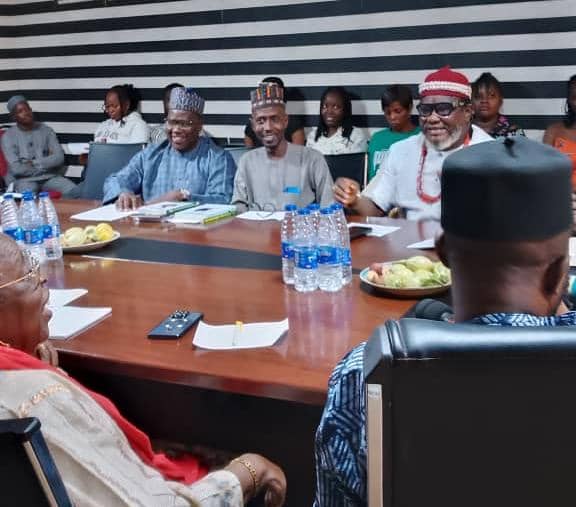Uncovering northern Nigeria’s neglected literary legacy at June Mbari session

By Khalid Imam
ON Saturday, June 28, 2025, in Abuja, I had the rare honour of participating in the prestigious MBARI June 2025 Edition, graciously hosted by ANA President, Dr. Usman Oladipo Akanbi. My contribution was unanimously described as thought-provoking and illuminating for inviting the audience to rediscover the hidden treasures of Northern Nigerian literary legacies.
Before it was my turn to speak, the reverential elder statesman Lindsay Barrett, a renowned Jamaican-born Nigerian journalist, poet and photographer who acquired Nigerian citizenship during General Yakubu Gowon’s regime, spoke. With a career spanning over six decades, Barrett took us down memory lane, narrating how he lived briefly at the Mbari building and reported its events and other sociocultural activities in Nigeria and West Africa since 1960s.
A seasoned academic and one of ANA foundation members still alive, Dr. Adewumi Oluwadiya, and a celebrated Nollywood actor and producer, Mr. Ugezu J. Ugezu, along with two other speakers, had the podium before me. Upon concluding my presentation, moderated by former ANA President, Mallam Denja Abdullahi, who asked me to conceptualize whether there was anything like Mbari in Northern Nigeria or not, I felt a profound sense of joy and accomplishment.
Although I paid glowing tribute to Chinua Achebe and other literary giants, my talk presented a compelling case for the existence of a rich literary heritage and robust cultural landscape in northern Nigeria, one that predates the era of literary titans like Chinua Achebe, Wole Soyinka, and the famed Kenyan literary genius, Ngugi wa Thiong’o.
My presentation shed light on the remarkable literary traditions that thrived in the region, with an impressive array of literature predominantly in the Hausa indigenous language that showcased the creativity and intellectual fervour of northern Nigerian pioneer writers. I highlighted the significant contributions of pioneering literary groups like the Bauchi Discussion Circle and the Kano Hikima Club, which fostered a culture of debate, creativity, and intellectual discourse. These organizations played a vital role in shaping the literary landscape of northern Nigeria, and their impact in sensitizing the public prior to Nigerian independence from British colonial rule; it was remarkable and continues to resonate today.
I paid glowing tribute to trailblazers like the memory of Sa’adu Zungur, Malam Aminu Kano, and the renowned Hausa poet, Mudi Sipikin, who was imprisoned several times for using his poems to oppose the Native Authority and the British colonial rulers. Sipikin’s poetic works, along with those of others, exemplified the region’s rich literary legacies.
Furthermore, I highlighted notable northern Nigerian political leaders who made significant marks in literature before venturing into politics, such as Nigeria’s former Prime Minister and author of award-winning novel Shaihu Umar, Sir Abubakar Tafawa Balewa and former President Shehu Shagari’s poem: ‘Wakar Nijeriya‘ (‘Song for Nigeria’), among many others.

ANA Mbari June 2025 session in progress with Khalid Imam (2nd from right facing camera)
One of the most striking aspects of my presentation was the reference I made to the poetic debate between Zungur and Sipikin in the 1950s. Zungur’s poem ‘Arewa Jamhuriya ko Mulikiya and Sipikin’s apt reply, ‘Arewa Jamhuriya Kawai‘, can arguably be considered one of the earliest debates about federalism in Nigeria. I posited that the north’s dominance in national politics could be attributed, in part, to the robust literary culture spearheaded by Hausa poets and other thinkers, a legacy of scholarship they inherited from the Usman Danfodio Jahadist scholars, who also used literature to export Islam across the northern region and beyond.
However, I lamented the vexatious neglect of the contributions of indigenous language writers from the north by literary scholars and critics. I concluded by stressing that ignoring these contributions continuously could have far-reaching consequences for our future.
Fortunately, Senator Shehu Sani, who attended the session, demonstrated leadership by example. After the session, he called Ibrahim Sheme and me aside, tasking us to develop a comprehensive proposal for instituting a prize to promote Hausa indigenous literature, which he is willing to fund. Many attendees, especially the younger generation, were surprised to learn that the literary movements I mentioned flourished in the north right from the 1930s and 1950s, decades before the likes of Achebe and Soyinka established the iconic Mbari Club in the 1960s. This testament to the region’s rich cultural heritage underscores literature’s enduring power to inspire, educate, and unite.
To digress, before the event kicked off, I explored parts of the venue. Frankly, I was impressed by the new ANA National Secretariat at Mpape, named after the late General Mamman Vatsa. The state-of-the-art edifice there is truly awesome and magnificent.
* Imam, a Kano-based award-winning bilingual poet, storyteller and playwright, is a school and arts administrator. He can be reached via khalidimam2002@gmail.com




